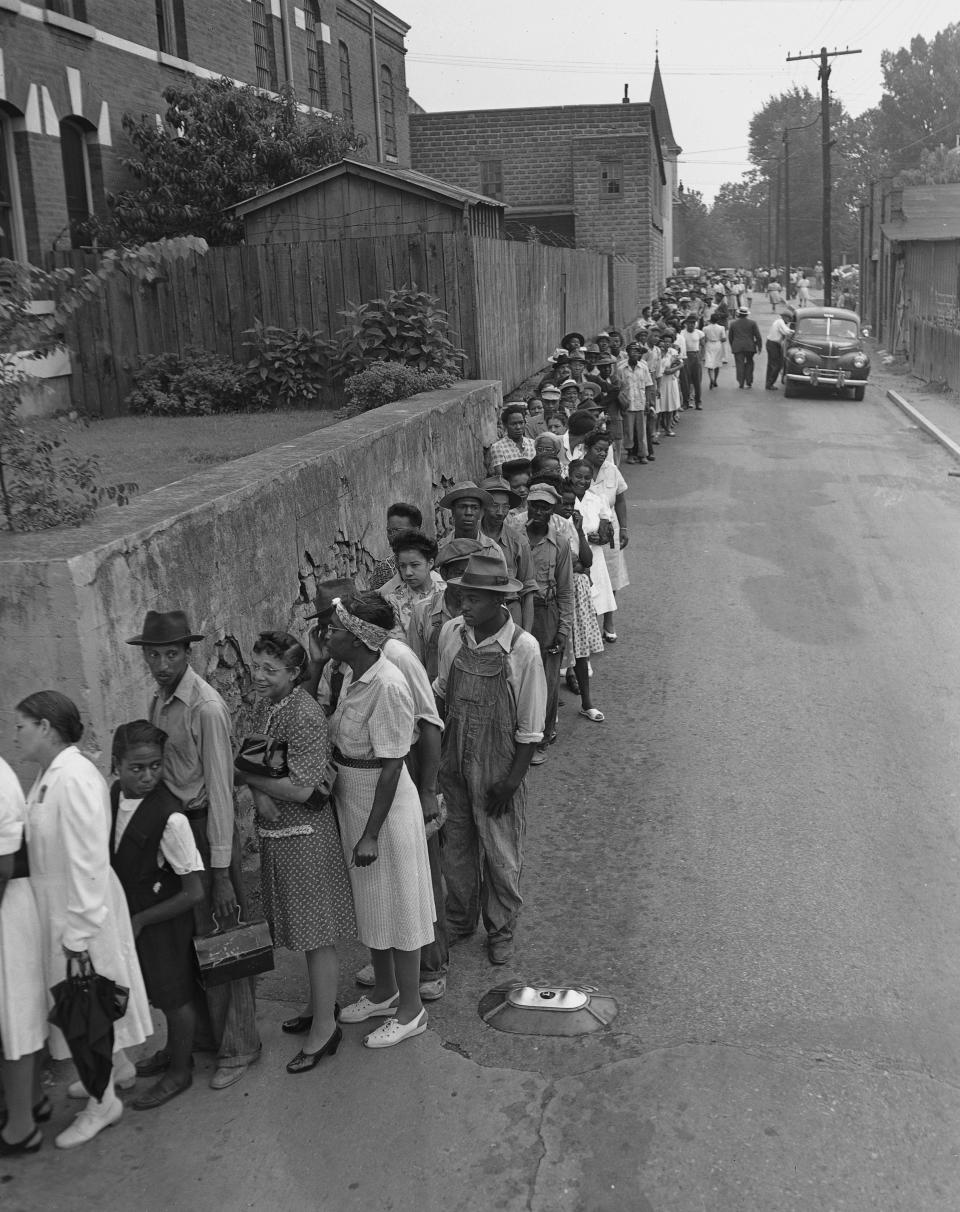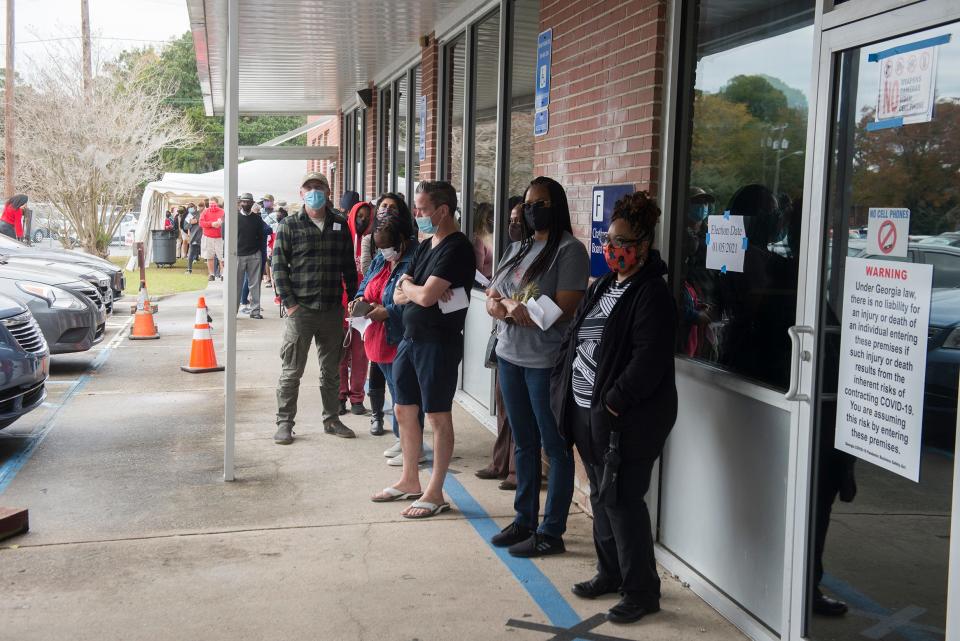For nearly 60 years, Georgia's voting rights laws have shifted with the political winds
- Oops!Something went wrong.Please try again later.
EDITOR'S NOTE: This page is part of a comprehensive guide to voting rights across the U.S. and in Puerto Rico.
To put a twist on a popular refrain from presidential State of the Union speeches, the state of Georgia's electorate is strong.
Historically strong.
"You see record levels of voter registration, record levels for general election turnout, and in the 2020 election, a record for runoff turnout," said Charles Bullock, a professor at the University of Georgia and the man considered the foremost expert in Georgia politics over the last half-century.
"Not everybody who is registered turns out, but we haven't seen participation like this at any time in memory."
Georgia has become a new political ground after a historic Democratic swing in the 2020 presidential and Senate races.
Not long after, during the 2021 legislative session, the Republican-controlled General Assembly re-evaluated portions of Georgia’s voting laws, especially provisions that contributed to the blue wave. They made changes in the name of "election integrity" in an effort to reassure voters, particularly those in the GOP, who expressed doubts about the 2020 outcome in the wake of former President Donald Trump's claims of election fraud.
Among the adjustments made were the narrowing of the window to request and return absentee ballots, limiting COVID-19-born measures like absentee ballot drop boxes, and giving the state elections board the power to take over “failing” county elections boards.
Other provisions did expand voter access, such as extending early voting periods.
The measures were the latest and most scrutinized change to Georgia’s voting law in the last 20 years, and drew national attention when President Joe Biden called it “Jim Crow 2.0.”
Closer to home, the latest round of voting reforms are framed differently. Republican lawmakers have expanded voter access since assuming legislative control in the early 2000s and bristle when accused of voter suppression. Georgia Rep. Ron Stephens, a Republican who has served in the Georgia House since 1997, notes the many instances of voter expansion over the last two decades, such as instituting early voting and no-excuse absentee balloting.
"When I think about the barriers that (Republicans) have broke down over the years to make it less restrictive to cast a ballot, I believe that's one of the reasons we're seeing great - record - turnout," Stephens said.
To understand the state of voting rights in Georgia, one must recognize the evolution of voting laws since the passage of the 1965 Voting Rights Act.
Federal scrutiny prompts changes
Voting reforms aren't anything new for Georgia. Many of the changes made to the state's voting law this century, including voter ID requirements, proof of U.S. citizenship, and voter roll purges, were nearly identical to the provisions used before passage of the Voting Rights Act.
Prior to 2013, when the Supreme Court held that Section 5 of the Voting Rights Act was unconstitutional in the Shelby County v. Holder case, the reforms would've likely required federal preclearance.

Almost a century after the 15th Amendment secured the right to vote for Black men, voters of color in Georgia were still disenfranchised by 1965, largely through literacy tests and convoluted voter registration procedures.
Following the passage of the Voting Rights Act of 1965, which outlawed voting discrimination by race, Georgia’s state voting law changes were put under the eye of the U.S. attorney general. Georgia would have to get "preclearance" to make changes to the election law.
The federal government interceded on dozens of proposed changes in Georgia between then and 2013, when the Supreme Court effectively removed the preclearance requirement, leaving the state free to implement whatever voting law changes the Republican-controlled legislature wanted.
What GOP control of Georgia General Assembly has meant
Democrats long owned Georgia from a legislative standpoint. The party controlled the House, Senate and the governorship.
The Republicans flipped two of those government branches in 2002, with Sonny Perdue defeating Roy Barnes, the incumbent, in the gubernatorial election and the GOP winning a majority of Senate seats. The House went Republican in the next election cycle.
The GOP takeover has ushered in many election law changes since — some that expanded voting, and others that have restricted access.
Republicans pushed through extended early voting hours through House Bill 244 in 2005, expanding opportunities for early, in-person voting to 45 days before an election. The option is open to any registered voter. Prior to 2005, in-person early voting was restricted to a single week before an election.
The GOP also enacted no-excuse absentee voting that year over the objections of Democratic lawmakers who feared doing so would "open the door wide" to voter fraud.
Republicans also made registering to vote easier, implementing an online voter registration portal and implementing automatic registration for any Georgian applying for a driver's license or state ID.
In 2018, Republicans pushed through HB 316, a voting law overhaul that extended the time before voters were removed from the voter rolls due to inactivity.
Additionally, it prevented polling places from being changed less than 60 days before an election.
The bill also updated the law to require Georgia's voting machines to print paper ballots, which ultimately led to the largest purchase of voting machines in state history, when the Dominion Voting System was implemented statewide.
The previous voting system's tally didn't have a paper audit trail, but Dominion machines print out a human-readable and QR code summary of a voter's choices. Voters actually cast their ballot by inserting the printout into a scanner that includes a lockbox.
The push for 'Jim Crow 2.0' in Georgia
Prior to the 2021 legislative session, election reforms were a regular part of lawmaker discussions. Typically, legislators took a "less is more" approach, making a piecemeal change here, a deadline change there. But following the state's Democratic flip in the 2020 presidential contest and former President Donald Trump's false claims that he won the election, the legislature looked to do an entire voting law overhaul.
As recently as January 2022, polls showed nearly three-quarters of Georgia Republicans believed there had been widespread fraud in 2020.
When the behind-closed-doors passage of Senate Bill 202 came down in 2021, the national spotlight was still brightly on Georgia, following the media blitz of the Jan. 5 Senate runoff.

Perhaps the most nationally known grievance with the bill centered on a provision that didn’t allow groups to pass out water to voters waiting in line or within 150 feet of a polling place.
A more significant change codified by SB 202 limited the state’s absentee ballot laws. There's a shorter window to request them. Voters can't request a ballot until 78 days before an election. The window closes 11 days before ahead of an election. That's down from 180 days.
In the 2020 presidential election, significantly more Georgia Democrats took advantage of absentee ballots to cast their votes than Republicans. Biden received 848,726 absentee votes, whereas Trump received 450,522.
Additionally, absentee ballot drop boxes, an emergency provision put in place by the Secretary of State during COVID-19, were limited to one box per 100,000 registered voters, or one per early voting site — whichever number is smaller.
Georgia’s much-criticized signature match provision for absentee ballots is a thing of the past with the new bill as well. Now, voters will be required to provide their driver’s license or state-issued ID number or a photocopy of another valid form of identification to cast an absentee ballot.
Secretary of State Brad Raffensperger has pushed back, rather publicly in some cases, against Trump’s false claims that he won Georgia in the 2020 election. He said the new changes, especially the changes to the verification of absentee ballots by driver’s license number, make it even more secure.
The bill also expands early voting access for most of the state's smaller counties, adding a mandatory day of Saturday voting, as well as formally codifying Sunday voting hours as optional. It also sets a minimum for early voting hours: 9 a.m. to 5 p.m., with the maximum limit being 7 a.m. to 7 p.m.

Additionally, counties must now report publicly how many people voted early, how many absentee ballots were issued, returned, accepted and rejected on a daily basis during early voting.
The Republicans pushed for more voter reforms during the 2022 session. Three versions of an election reform bill were filed during the session, but ultimately, legislators made just one change, tacked onto the end of another bill.
Toward the end of the last day of the 2022 session, SB 441 was introduced, called the Criminal Records Responsibility Act, with a provision giving the Georgia Bureau of Investigation original jurisdiction over suspected election law violations and subpoena power in those investigations.
Aside from that, Raffensperger pushed for an amendment to the Georgia constitution that would specifically bar noncitizens from voting. That effort failed.
Election reform will continue to be a popular topic in Georgia. Democratic gubernatorial candidate Stacey Abrams has made expanding voting rights a cornerstone of her campaign, as have many other candidates for statewide office and the Georgia General Assembly.
How Georgians vote in November will have bearing on the next iteration of voting law changes.
Will Peebles is the enterprise reporter for Savannah Morning News. He can be reached at wpeebles@gannett.com and @willpeeblessmn on Twitter.
This article originally appeared on Savannah Morning News: Did Georgia's 2021 voting law violate the Voting Rights Act?

